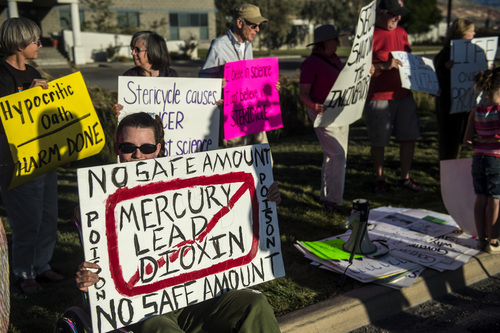This is an archived article that was published on sltrib.com in 2014, and information in the article may be outdated. It is provided only for personal research purposes and may not be reprinted.
It is difficult to imagine anything that could do more to boost the re-election chances of Utah Attorney General Sean Reyes than for him to walk up to the gates of the Stericycle medical waste incinerator in North Salt Lake with a detachment of state troopers, a freshly signed cease-and-desist order and a chain and padlock.
Assuming, that is, that such an action would be both warranted by the facts and allowed under the law.
And those are questions that Reyes' office, along with the Utah Department of Environmental Quality and the Utah Department of Labor, should be very busy answering.
Gov. Gary Herbert, who is not up for re-election this year, Thursday formally requested that Reyes, who is, launch a criminal investigation into allegations that the plant is operating in violation of environmental and labor laws by doing things than endanger the health of their neighbors and of their employees.
Folks in the neighborhood, and environmental activists, have long claimed that Stericycle, which burns medical wastes, is a clear and present danger. They cite both official reports and video images of occasional plumes of ominous black smoke rising from the plant's stacks as evidence that power outages and other malfunctions lead to frequent release of wastes that, under state and federal law, aren't supposed to be released.
Some independent experts also claim that, even if Stericycle is in strict compliance, it still creates an unacceptable health hazard because, by its very nature, the incineration of medical wastes releases dangerous compounds, and some radioactive materials, into the atmosphere. All such establishments, they argue, should be shut down and the wastes they now process diverted to shredders, sterilizers and landfills.
The whole debate was turned up several degrees the other day when an online video documentary about the medical waste business featured an anonymous whistle-blower charging that workers in the plant have been specifically instructed by their supervisors to do things that amount to clear violations of company and government rules.
A serious investigation — with subpoenas, records searches and no-holds-barred interviews with current and former Stericycle employees — is clearly called for.
It is unlikely that such a probe could reach any actionable conclusions in time for the Nov. 4 election. But it should happen anyway.
And Stericycle's planned move to the Tooele County West Desert should certainly be placed on hold pending its outcome.



